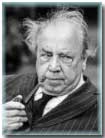Prose & Poetry - J.B. Priestley
 British journalist, novelist,
playwright, and essayist (1894-1984). Priestley's output was vast and
varied - he wrote over one hundred novels, plays, and essays, and is best
known as the author of the novel The Good Companions (1929).A man of
versatility, he was a patriot, cosmopolitan Yorkshireman, professional
amateur, cultured Philistine, reactionary radical, and a common-sense
spokesman for the ordinary man-in-the-street. Priestley refused both
knighthood and peerage, but accepted in 1977 the prestigious Order of Merit.
British journalist, novelist,
playwright, and essayist (1894-1984). Priestley's output was vast and
varied - he wrote over one hundred novels, plays, and essays, and is best
known as the author of the novel The Good Companions (1929).A man of
versatility, he was a patriot, cosmopolitan Yorkshireman, professional
amateur, cultured Philistine, reactionary radical, and a common-sense
spokesman for the ordinary man-in-the-street. Priestley refused both
knighthood and peerage, but accepted in 1977 the prestigious Order of Merit.
"I can't help feeling wary when I hear anything said about the masses. First you take their faces from 'em by calling 'em the masses and then you accuse 'em of not having any faces." (from Saturn Over the Water, 1961)
Priestley was born in Bradford, West Yorkshire, in the north of England. His father, Jonathan Priestley, was a prosperous schoolmaster; his mother died when he was an infant. Priestley attended Bradford Grammar School, but left his studies at the age of sixteen and worked as a junior clerk in a firm (1910-1914). In Bradford Priestley began to write poetry for his own pleasure and contribute articles to local and London papers.
During WW I Priestley served with the Duke of Wellington's and Devon regiments, and survived the front lines in Flanders. From 1919 he studied at Bradford and at Cambridge literature, history and political science, receiving his B.A. in 1921. From 1922 he worked as a journalist in London, starting his career as an essayist and critic at various newspapers and periodicals, including the New Statesman. His first collection of essays, Brief Diversions, appeared in 1922.
Priestley gained international popularity with his novel The Good Companions, a tale about the adventures of a troop of travelling players. "To say that these men paid their shillings to watch twenty-two hirelings kick a ball is merely to say that a violin is wood and catgut, that Hamlet is so much paper and ink. For a shilling the Bruddersford United AFC offered you Conflict and Art." (from The Good Companions) It was followed by Angel Pavement (1930), depicting the people of London and what happens to them when an adventure comes to them in the person of the mysterious Mr. Goldspie.
As a playwright Priestley started in the 1930s with such popular comedies as Dangerous Corner (1932), based on the idea that telling the whole truth is like rounding a corner of two wheels, Laburnum Grove (1933), an unmasking of hypocrisy, and Time and Conways (1937), in which Priestley draw his ideas of Time from the works of J.W. Dunne and Ouspensky. Priestley also founded his own production company, English Plays, Ltd., and in 1938-39 he was director of the Mask Theatre in London. Altogether he wrote about 50 plays.
Among Priestley's other books were English Journey (1934), a seminal work in arousing social conscience in the 1930s, Literature and Western Man (1960), a survey of Western literature over the past 500 years, and his memoirs, Margin Released (1962). Priestley's novel The Magicians (1954) showed the influence of the Swiss analytical psychologist Carl Jung. The last of his novels was Found, Lost, Found (1976), an old-fashioned fairy tale and love story in a modern setting.
After the outbreak of World War II Priestley gained fame as 'the voice of the common people'. He was a patriotic radio broadcaster, second only to Churchill. At the early stage of the Cold War, he became known for his support for the Campaign for Nuclear Disarmament. In 1946-47 he was a U.K. delegate to UNESCO conferences.
Priestley married three times, for the first time in 1919 with Emily Tempest, who died young in 1925, then with Mary ('Jane') Wyndham Lewis, the former wife of the biographer and satirist Wyndham Lewis. In 1953 he married the archaeologist and writer Jacquetta Hawkes. They lived in Warwickshire in Kissing Tree House, situated near Stratford-upon-Avon. Priestley wrote with her the travel book Down a Rainbow ( 1955), which was based on a journey in New Mexico.
During his career Priestley published over 120 books, usually light and optimistic in their tone. His prolific production continued nearly sixty years. From the age of 70 to 84 Priestley published yet 21 books. Priestley died on August 14, 1984.
As an essayist Priestley wrote for the 'middle brow' audience. The topics and themes are numerous. In his pamphlet Letter to a Returning Serviceman (1945) Priestley shared the common sentiment that Britain was obliged to be rebuilt after the war along socialist lines. In Britain and the Nuclear Bombs (1957) he argued for the moral superiority that unilateral nuclear disarmament would bring.
Disturbing (1967) criticized contemporary playwrights for creating works that sought to 'disturb' a reading public already disturbed by their own problems, and in Particular Pleasures (1975) he stated that works of art should meet some need, and not be evaluated on programmatic grounds. Priestley's highly enjoyable essay The Toy Farm (1929) tried to answer why toys enchant even adults:
"These toys transform you at a stroke into a god, and a happier god than any who looks down upon our sad muddle. It is, of course, the more poetical of our activities that are chosen as subjects for these bright miniatures of the nursery, yet there is so much poetry in the toys themselves that even if they mirrored in little even the most prosaic things, they would still be satisfying."
Article contributed by Petri Liukkonen, website Author's Calendar.
The USA suffered 57,476 fatal army casualties during the war.
- Did you know?
